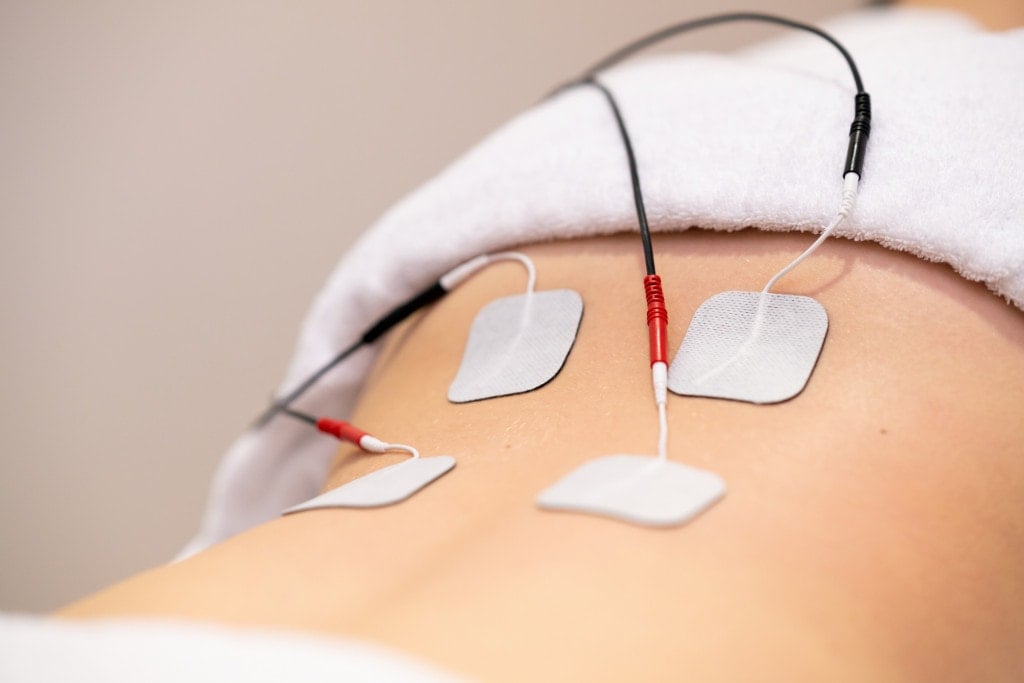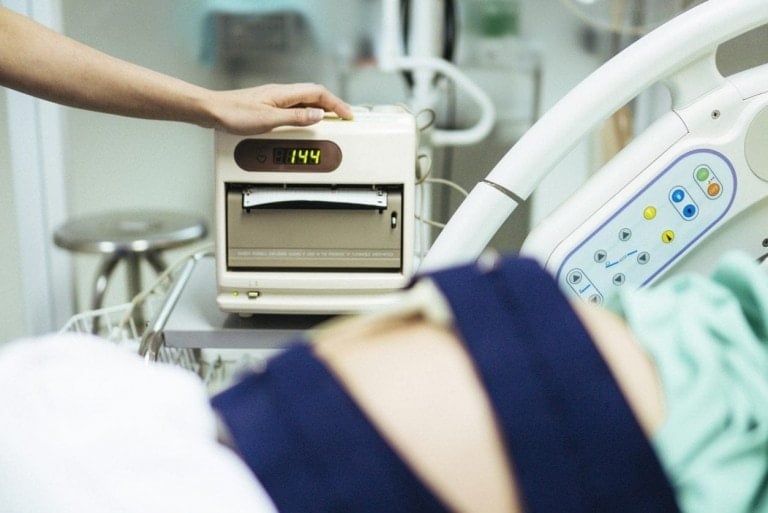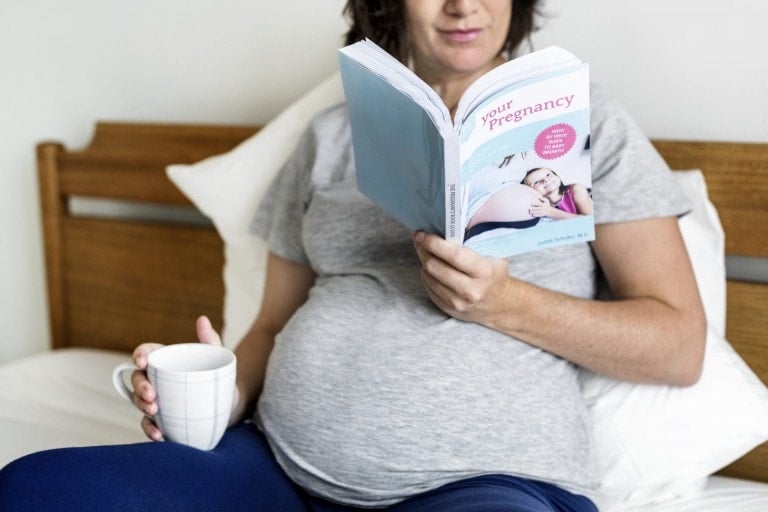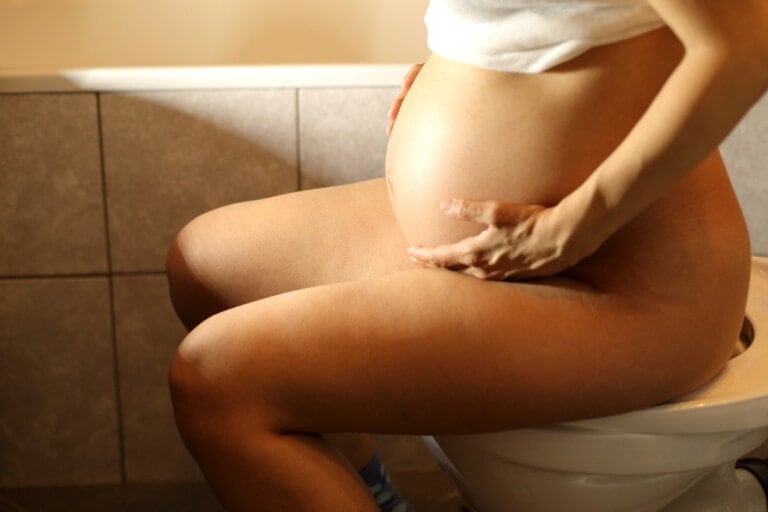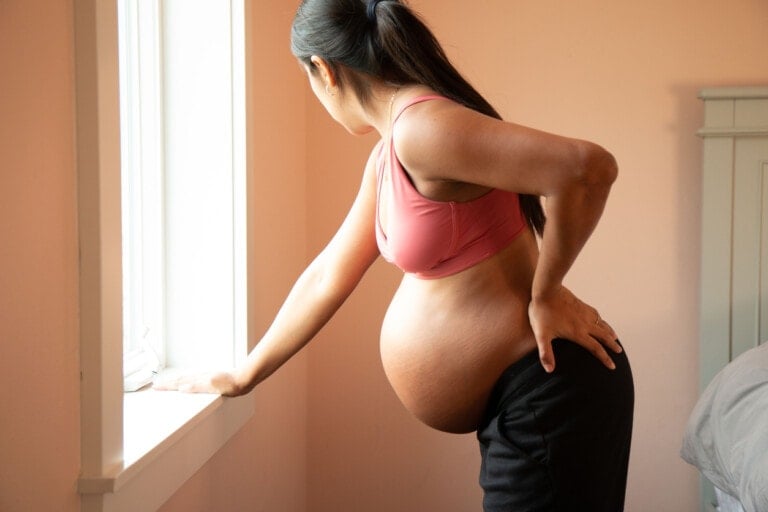Finding effective relief from the aches and pains of pregnancy can feel impossible. When I was 34 weeks pregnant with my first daughter, I was bedridden for nearly a week due to rib pain that made it unbearable to move. Since most pain medications were off the table due to a risk to the baby during pregnancy, I turned to nonpharmacologic interventions for pain relief, which included a TENS unit.
A TENS unit can be used during pregnancy and for labor to provide temporary pain relief instead of (or in addition to) medication. Here, we will explain what a TENS unit is, how it works, and how to use it safely during pregnancy and labor.
What Is a TENS Unit?
TENS stands for transcutaneous electrical nerve stimulation, a fancy way of saying shock waves are sent through the skin to stimulate nerves beneath.1
A TENS unit is a small, usually handheld, and battery-operated device. Wires connect the handheld part of the device to four sticky TENS pads or electrodes. The electrodes are applied to the skin on a targeted body area. The wires transmit an electric signal from the device to the pads. You can control the intensity and pattern of the stimulation on the device.2
What Does a TENS Unit Feel Like?
A TENS unit feels like tiny shocks, vibrations, or a focused massage. Others describe it as tingling or buzzing.3 Depending on the power setting, the sensation can range from faint and mild to intense. You can easily adjust the settings on the device while using it.
What Does a TENS Unit Do?
A TENS unit delivers shock waves of different frequencies, intensities, and durations to stimulate muscle contraction and nerve activation. This can be used to treat both acute and chronic pain.2 The exact way that a TENS unit works to relieve pain is not fully understood.3
Stimulating nerves can block pain information from traveling to the brain so you feel less discomfort. TENS shock waves can also cause muscle contraction, numbness, and tingling in the affected area.2
TENS units may stimulate the release of endorphins, hormones that decrease pain. TENS units also provide their users with a distraction from pain and a sense of control, thereby reducing anxiety and discomfort.3 Depending on the type and cause of pain and the treatment goal, all these TENS unit functions can provide at least temporary pain relief during pregnancy.
Is Electrical Stimulation Safe During Pregnancy?
You should always discuss medical interventions, including the use of a TENS unit during pregnancy, with your provider.
The use of a TENS unit is probably safe in pregnancy. In a systematic review of TENS unit use in labor, no adverse events were reported from 1,671 women.4
While manufacturers recommend that a TENS unit should not be used in pregnancy, this is likely due to legal risk. For your and your baby’s safety, avoid placing the TENS pads on or near your abdomen to prevent stimulating the uterus or baby.2,5 You should only use the TENS unit after discussing this intervention with your medical provider.
How To Use a TENS Unit in Pregnancy
To use a TENS unit during pregnancy, you must apply the TENS pads on your skin along the affected areas of pain. TENS unit placement depends on the location of your pain. If the pain is in a place you cannot reach, you may need to ask your partner or provider to help you. After applying the pads, turn on the device. You can adjust the frequency, intensity, and pulse width to your comfort.2 You can leave the unit on for minutes to hours and use the device multiple times daily.6 Pain relief from a TENS unit may last for minutes to hours after the “dose” is administered.5
When I had rib pain during pregnancy, I applied the pads along the irritated rib muscle from front to back. Each TENS pad should be placed at least 1 inch away from the next pad.2 You do not have to apply all the pads. Any pads not applied to the skin can be left adhered to the plastic film sheet on which the electrodes are packaged.
The electrodes should only be applied to intact skin with full feeling and sensation.2 Remember that it is recommended to avoid placement on the abdomen during pregnancy.
How To Use a TENS Unit for Labor Pain
During labor, the TENS unit electrode placement should form a square on the lower back, framing the lower spine. This is where it is thought that the nerves transmitting pain from uterine contractions enter the spine.3
Electrodes can also be applied to acupressure points during labor to relieve pain.3 Some women may want the electrical stimulation only during a contraction. The TENS pads can be left in place, and the unit can be turned on and off easily. Some points to consider for labor pain relief include:7
- SP6, which lies three thumb widths above the inner ankle
- SP9, found in the depression in the lower inner knee
- GB21, where your neck meets your shoulders
What Are the Benefits of a TENS Unit in Pregnancy?
There are many benefits to using a TENS unit in pregnancy. Using a TENS unit can be a safe, effective, and inexpensive way to reduce pain during or caused by pregnancy.2,6,8 One study even showed that using a TENS unit improved lower back pain more effectively than acetaminophen (Tylenol) or exercise.8 TENS units also carry no risk of overdose.2
TENS units give you a sense of control over your pain. You can usually apply and operate the unit yourself. They can reduce maternal stress and possibly the length of labor and the need for other interventions.3
Potential Risks of a TENS Unit for Pregnancy and Labor
The TENS unit has few, typically minor, side effects. The most common issue is a skin reaction to the electrode pads, but hypoallergenic pads are available. Fainting and nausea in response to the TENS unit are also possible.2
TENS units can theoretically interfere with other electrical equipment, so they should not be used with pacemakers. They should also not be used in people with epilepsy for the risk that they could cause a seizure.3
Finally, TENS units should not be used in the water, which can interfere with your birth plan if you were hoping for hydrotherapy for pain relief or a water birth.2
Why Can’t You Use a TENS Machine Before 37 Weeks?
TENS units administer an electrical current through the skin to the muscles, nerves, and tissue below and hence can cause muscular contraction. The uterus is a muscle that can respond to electrical stimulation.2
There is a theoretical risk that using a TENS machine before 37 weeks could jumpstart labor and cause preterm delivery. However, studies of TENS unit usage have been performed in pregnant women before 37 weeks with no adverse effects. There is also a theoretical risk that using a TENS unit before 37 weeks could cause irregular heartbeat in the fetus or birth defects.9
If you decide to use a TENS unit before 37 weeks of pregnancy, be sure to avoid applying the pads to the abdominal area and stop usage if you feel any uterine contractions.
Where Can I Get a TENS Unit for Labor?
TENS units are available at most pharmacies without a prescription. They are also available online. You may need to purchase batteries separately.
While there are benefits and risks to every intervention, TENS units can be relatively safe, inexpensive, and effective relief tools for the aches and pains of pregnancy. When you have exhausted pregnancy-safe pain medication and other homeopathic interventions with little relief, you might feel desperate for a few moments without discomfort. You can apply a TENS unit to the affected area and relax into relief.













